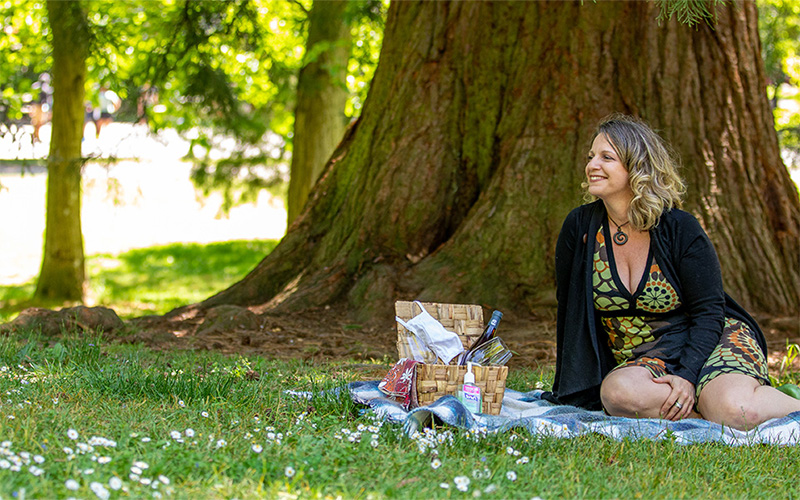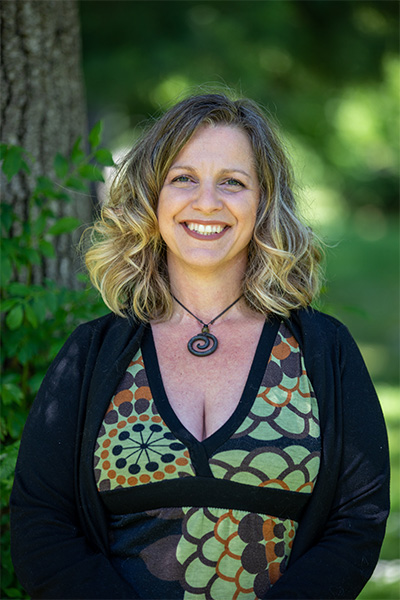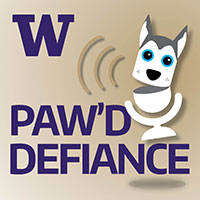
Love Story
UW Tacoma Associate Professor Riki Thompson researches online dating including how the digital age changed the way we tell stories about ourselves.
This Section's arrow_downward Theme Info Is:
- Background Image: ""
- Theme: "light-theme"
- Header Style: "purple_dominant"
- Card Height Setting: "consistent_row_height"
- Section Parallax: ""
- Section Parallax Height: ""
Maybe you’ve seen this picture. A shirtless man stands in front of a mirror. He’s either smiling or wearing a look of casual detachment/posed bravado. The man’s chest is puffed out and his stomach is tight. The latter effect is achieved through exercise or by holding one’s breath.
How about this one? A woman with the classic “duck lips” pose gazes into the camera. She has antlers coming out of the top of her head. Her nose is more deer-like than human and her eyes are bulging like, well, she’s just seen headlights. The original photo and the woman’s actual appearance are lost to an animal-themed Snapchat filter.
Neither of these are hypotheticals. Users of dating sites and apps come across these types of images on a regular basis. “They’ve become tropes,” said UW Tacoma Associate Professor Riki Thompson. Thompson researches online dating including how people construct self-identity through stories as well as the politics and practices of online dating in terms of identity, sexuality, race, and gender.

Dating, to some extent, has always been a story. First dates are sort of miniature plays with each person performing a version of themselves. Don’t believe it? Think about all the things you normally do that you wouldn’t do on a first date.
The digital age has changed how we date and how we tell stories about ourselves. “When you look at personal ads in the newspaper or the beginning of internet dating it was all about the text,” said Thompson. “You had to have linguistic competence, you needed to be able to have a conversation.” Photos were an afterthought either because of cost, poor image quality or the limitations of available technology.
The opposite is true now. For starters, the personals section of newspapers have largely disappeared. They’ve been replaced by dating sites and apps where pictures have become the primary way people construct self-identity. “They have to have the ‘right’ kinds of pictures,” said Thompson. What does this look like? “That’s a big question,” said Thompson. “Generally, people want photos that provide an accurate representation of who the person is at this moment, offer a clear view of the face, give a sense of the person’s body size and make it easy to tell who the person is — that isn’t a ‘Where’s Waldo’ mish mash of people.”
Some of the “wrong” kind of pictures include those featuring topless men or images that are heavily filtered. Note, this applies only to heterosexual daters. Thompson says other tropes exist for the LGTBQ+ community and non-monogamous daters. “Women despise the shirtless selfie guy and a lot of men are turned off by women who use a lot of filters,” said Thompson.
The advent of swiping apps turned the idea of courtship on its head. Instead of working up the courage to walk up to a stranger and strike up a conversation or even read through lengthy profiles, users can flick through a ready supply of profile pics in a matter of seconds. “People are utilizing online dating spaces almost like they’re shopping,” said Thompson. “One of my research participants said it best, ‘People are looking for ways to discount others rather than count them.’”
For her research, Thompson has conducted interviews, observations and profile analyses with more than 100 people. All of the participants either currently use online dating platforms or have in the past. A third of those interviewed are UW Tacoma students, faculty, staff and alumni. The rest are people from elsewhere in the Pacific Northwest and other parts of the United States and six of the interview subjects live in other countries. Participants represent diverse sexual orientations, gender identities, and relationship styles, with more than half identifying as members of the LGBTQ+ community. A majority of participants, 70%, identified as white or Caucasian with 30% using a variety of racial and ethnic identities, including biracial and mixed race.
Participants are asked a range of detailed questions from what sites/apps they use to why they chose specific images or words when constructing their digital persona. Early results suggest the switch to online dating hasn’t made the process any easier. “The more I dug into this topic the more I recognized the importance of helping people to become more reflective and conscious about what they are putting out there,” said Thompson.
To this extent, online dating tends to be a very communal affair. The most “successful” of Thompson’s subjects had some help. “They talked to other people and got feedback from people in their world,” said Thompson. These participants also had a lot of experience using dating platforms and learned what works and what doesn’t through a process of trial and error.
Thompson’s research shines a light on the different ways people use dating sites and apps. “Many men tend not to read profiles or, if they do, it’s not until after they’re matched with someone,” she said. “They’re playing a numbers game and are more likely to swipe yes on people based on only viewing the first profile picture.” When it comes to photos, women are certainly looking to see if they’re attracted to the person but they’re also doing some detective work. “Unlike men, women want to see group pictures,” said Thompson. “They use this as evidence of sociality, that a person has friends.”
Thompson’s interest in digital dating platforms stems, at least somewhat, from her own experience. “I’d gotten divorced and was exploring different ways of meeting people,” she said. Incidentally, Thompson says, a lot of conversations she’s had with her study participants started with “I’d just broken up” or “I’d just gotten divorced.” “Many of these people created profiles that were a response to past heartbreak and were meant to attract the opposite type of person from their last partner.”
To an extent, Thompson turned her foray into digital dating into research. “I started to analyze a few profiles then went back and revised my profile,” she said. “And I thought, how many people go back and revise? From there I began asking more and more questions about this process.”
Listen to Riki Thompson talk about "Survival Dating" on the latest episode of Paw'd Defiance, the UW Tacoma podcast.
About Paw’d Defiance

The title of our show is more than just a clever play on words. The name reflects a philosophy, one that is committed to telling interesting stories about the people, research, initiatives, community partnerships and other issues related to UW Tacoma and higher education. It also speaks to our interest in the greater Tacoma community. Point Defiance is inexorably linked to the Grit City. Also, “defiance” is a fun word and, either intentionally or not, speaks to Tacoma's history as the “other” city in the Puget Sound region.
Thank you to Doug Mackey at Moon Yard Recording Studio for his recording support and Senior Lecturer Nicole Blair for our theme music. The first season of this podcast was made possible by funding from the UW Tacoma Strategic Initiative Fund.
You can find Paw'd Defiance on iTunes, Stitcher, Google Podcasts, Pocket Casts and Spotify. You can also click here to listen: Paw'd Defiance
Recent news
Main Content
Gathering Strength
News Tags on this arrow_upward Story:
- None
Main Content
UW Tacoma Enrollment up 4% for Autumn 2024
News Tags on this arrow_upward Story:
- None
Main Content
Celebrating First Gen
News Tags on this arrow_upward Story:
- None



